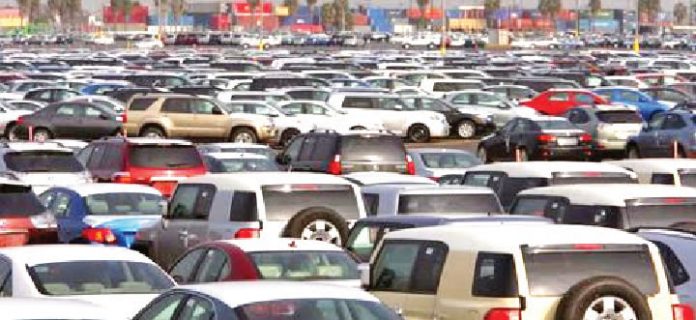The 70 per cent drop in vehicle importation into the country coupled with global trade disruption, the flotation of the exchange rate, and other factors have led to a 4.5 per cent drop in revenue collection by the Nigeria Customs Service in the first half of this year, according to a document obtained from the agency.
In the document exclusively obtained by Sunday PUNCH, it was revealed that in the first six months of 2022, the NCS collected a total of N1.4tn and in the same period of 2023, a total of N1.3tn was collected.
The recent 40 per cent hike in the exchange rate for cargo clearance at the seaports and the increase in tariff on imported cars by a terminal operator, Ports & Terminal Multipurpose Limited, had led to about a 70 per cent drop in the sale of imported used cars.
Recently, the Central Bank of Nigeria and the Nigeria Customs Service took the ongoing foreign exchange reforms to the maritime sector with a 40 per cent increase in the dollar-to-naira exchange rate used for calculating the import duty.
The NCS had a few weeks ago raised the exchange rate used for the calculation of import duty from N422.30/dollar to N589/dollar.
The development, which led to a corresponding 40 per cent increase in import duties on imported cargoes, including vehicles, caused anxiety among operators in the maritime sector with clearing agents, freight forwarders, and importers calling for an immediate reversal of the policy.
As that was gradually sinking in, the CBN raised the exchange rate for cargo clearance by 31 per cent. The interest rate was moved from N589/$ to N770/$.
The NCS announced this development in a circular dated July 4, 2023, titled, ‘Implementation of the floating foreign exchange rate regime,’ which was signed by the Assistant Controller General, IT & Modernisation, K. I. Adeola.
“The CBN has instituted the floating exchange rate regime, which has given rise to incessant changes in the exchange rate for trade. The policy is to be implemented by all ministries, departments, and agencies of the government, including the NCS,” the circular read in part.
The service through the circular directed its area controllers to ensure that the information was communicated to relevant stakeholders.
These developments have led to a drop in cargo throughput, which has driven down the Customs revenue in the first half of the year.
Speaking on the decline in revenue, the National Public Relations Officer, NCS, Abdullahi Maiwada, said whenever there was a drop in cargo throughput, revenue would mostly drop.
He said, “There are so many factors that can lead to a revenue drop. Traditionally, the revenues in the first three months of the year are usually inconsistent because importation drops in the first quarter. So, definitely, we expect a rise in revenue in the second half of the year. Basically, the reason is that there is a drop in cargo throughput, which means there is a drop in importation.
“Also, global economic challenges can also lead to a drop in cargo throughput. So, all those things when you put them together lead to a drop in revenue collection.
“Definitely, when we enter the second half of the year, you will see a steady improvement in revenue collection. I am talking about the cargo throughput; if the importation is reduced, then the revenue collection will also reduce. The difference is not much, so we are fine.”
Speaking on the development, the acting National President of the Association of Nigerian Licensed Customs Agents, Kayode Farinto, said the Customs revenue would drop more in the coming months.
“The reason is that our economy is yet to be stable; there is a new government and fuel subsidy removal and exchange rate fluctuation are making the revenue drop and it will drop more, because, by next week, the exchange rate will increase; so, it is expected to drop more until the naira exchange rate to the dollar stabilises before anybody can say revenue will increase,” he said.
The founder of the National Council of Managing Directors of Licensed Customs Agents, Lucky Amiwero, said the Customs do not follow the law.
According to him, the new Customs Excise Management Act only focuses on revenue generation, which could leave smaller businesses frustrated.
Amiwero said, “Revenue collection for the Customs is attributed to so many things; the Customs do not follow the law and secondly, in the new CEMA, you find that they are looking for revenue by all means. When you look for revenue by all means, you frustrate the importers and most of them will not import.
“That is not revenue. Revenue should not be a watchword. Trade facilitation should be the watchword.”
The licensed Customs agent also said the current CEMA was the worst document in the world.
Amiwero added, “So, we have one of the worst documents in that CEMA. One of the cores of trade facilitation is the power of appeal and that law is making the Customs to be the house you have to appeal to. It is not done anywhere in the world.”
The Chief Executive Officer, Centre for the Promotion of Private Enterprise, Dr Muda Yusuf, said, “All the problems in the sector will lead to the high cost of importation. If people are not importing, how will you generate the revenue?
“You know what affects vehicle importation also affects other imports too as they are using the same exchange rate. The Customs should slow down on this revenue drive, which is threatening the economy.”
Share your story or advertise with us: Whatsapp: +2347068606071 Email: info@newspotng.com










